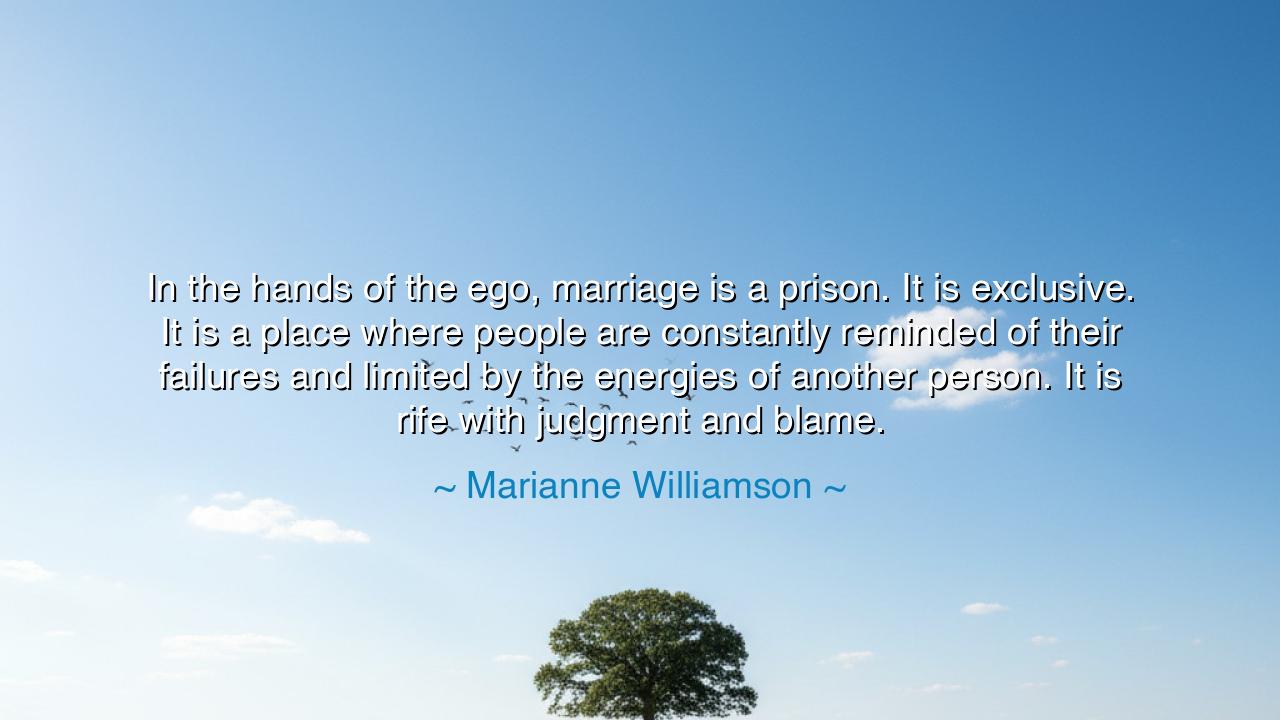
In the hands of the ego, marriage is a prison. It is exclusive.
In the hands of the ego, marriage is a prison. It is exclusive. It is a place where people are constantly reminded of their failures and limited by the energies of another person. It is rife with judgment and blame.






In the ancient teachings of the wise, the very concept of marriage was considered one of the most sacred unions between two souls. It was seen as a partnership not only of hearts and minds, but of spiritual growth, a journey toward mutual fulfillment and divine connection. Yet, as Marianne Williamson so powerfully articulates, when the ego takes control, marriage becomes not a sacred union but a prison. "In the hands of the ego, marriage is a prison. It is exclusive. It is a place where people are constantly reminded of their failures and limited by the energies of another person. It is rife with judgment and blame." These words are a stark warning—marriage, meant to elevate and liberate, can become a shackling force when driven by the ego and selfishness.
In the world of Socrates and the great thinkers of ancient Greece, the concept of ego was tied to the desires and attachments that bound humans to the world of illusion. Socrates taught that true wisdom comes when one relinquishes the ties of the ego—the selfish impulses that prevent one from seeing the world clearly. To him, the ego was a false self, a shadow that distorted our understanding of what it means to love and connect with others. In this light, marriage—a bond meant to bring people together in profound partnership—becomes corrupted when driven by the ego, turning into a space of judgment, blame, and resentment. The sacred union that should have been a journey of mutual upliftment becomes, instead, a struggle, where one partner’s desires dominate, and the other is trapped in the never-ending cycle of failure and criticism.
Consider the story of the ancient Egyptian pharaohs, many of whom formed political and social unions through marriage, not always for love, but for power, status, and legacy. Cleopatra, one of Egypt’s most iconic rulers, married Julius Caesar and later Mark Antony, not just for companionship but to secure her reign in a world dominated by male power. Yet her marriages, while strategic, also contained deep emotional and psychological turmoil. Despite the romanticized view of her relationships, these unions, bound by ego and political ambition, were fraught with betrayals, misunderstandings, and frustrations. The very union intended to consolidate power became a prison of expectations, insecurities, and judgments, demonstrating how the ego can twist even the most powerful unions into places of resentment and disillusionment.
In the modern world, we see echoes of this theme in the relationships where ego runs rampant, distorting the true nature of love and partnership. Many modern marriages, particularly those bound by material success, societal expectations, or personal gain, often fall into the trap of exclusivity and competition. Instead of a union built on shared growth and mutual respect, these marriages become a reflection of the individual’s ego—a space where one’s insecurities are constantly projected onto the other. Williamson’s words point to the truth that when love is enslaved by ego, marriage loses its transformative power. It becomes a battlefield of blame, where one partner’s failures are magnified and the potential for shared happiness and growth is suffocated by judgment.
One of the greatest examples of the struggle between ego and love can be seen in the lives of Romeo and Juliet—the tragic lovers from Shakespeare’s iconic play. While their love is pure and transcendent, it is also marred by the ego of their families, who are trapped in a generational cycle of resentment and pride. Their families’ pride and self-interest prevent Romeo and Juliet from finding peace together. The tragedy of their union is rooted in the selfishness and ego of their families, who refuse to see beyond their own bitterness. In their deaths, they embody the ultimate sacrifice of love over ego, but it is only after their tragic fate that their families are forced to reckon with the damage done by their own pride and failure to nurture love in its truest form.
Williamson’s wisdom calls us to examine the ways in which ego can distort the most beautiful and sacred of human unions. True love is not about ownership or possession, nor is it about fulfilling one’s own selfish needs or desires. In a union where ego dominates, love becomes transactional, judgmental, and full of resentment. The key to a transformative marriage—one that brings both partners to a place of mutual growth—lies in releasing the need for control and embracing vulnerability. A true partnership is one where both individuals can flourish, not because they feed the desires of the ego, but because they empower one another to become their best selves, free from the chains of judgment and blame.
The lesson we must carry forward from Williamson’s words is a call for self-awareness and selflessness in relationships. To build a marriage—or any partnership—that is truly transformative, we must shed the layers of ego that block our ability to see one another clearly. We must strive to be vulnerable, open, and supportive—not in order to gain control, but to build a shared future rooted in mutual respect, equality, and love. In our own lives, we must ask ourselves: How can we let go of the need to be right, the desire to control, and instead embrace the beautiful dance of true partnership? Only then can we create the space for love to flourish, not as a prison, but as a sanctuary of freedom, growth, and endless possibility.






AAdministratorAdministrator
Welcome, honored guests. Please leave a comment, we will respond soon